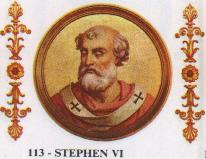
Stephen was the cardinal priest of Saints Quattro Coronati when he was elected pope in 885. He was consecrated without imperial approval, and Charles III the Fat did not approve of his election nor of his coronation without consent. Stephen was able to show Charles' representatives that the king's ambassador had helped him to gain his position. Stephen invited Charles to Rome, but the emperor was deposed before he could accept. Stephen refused to acknowledge Photios as Patriarch of Constantinople and forbade the use of Slavonic in the Moravian church. When Saracens threatened Rome, Stephen asked aid of Arnulf, who had deposed Charles, but Stephen died (891) before military aid arrived.
Pope from 896 to 897 "Stephen VI" redirects here. For the Moldavian ruler, see Ştefan VI Rareş. In sources prior to the 1960s, this pope is called Stephen VII and Pope Stephen V is called Stephen VI; see Pope-elect Stephen for a detailed explanation.Pope Stephen VI (Latin: Stephanus VI; died August 897) was the bishop of Rome and ruler of the Papal States from 22 May 896 to his death. He is best known for instigating the Cadaver Synod, which ultimately led to his downfall and death.
Family and career
Stephen was born in Rome. His father was a priest named John. Stephen was made bishop of Anagni by Pope Formosus, possibly against his will.
Pontificate
The circumstances of his election as pope are unclear, but he was sponsored by one of the powerful Roman families, the dukes of Spoleto, that contested the papacy at the time.
Stephen is chiefly remembered in connection with his conduct towards the remains of Pope Formosus. The rotting corpse of Formosus was exhumed and put on trial, before an unwilling synod of the Roman clergy, in the so-called Cadaver Synod in January 897. Pressure from the Spoleto contingent and Stephen's fury with Formosus probably precipitated this extraordinary event. With the corpse propped up on a throne, a deacon was appointed to answer for the deceased pontiff. During the trial, Formosus's corpse was condemned for performing the functions of a bishop when he had been deposed and for receiving the pontificate while he was the bishop of Porto, among other revived charges that had been levelled against him in the strife during the pontificate of John VIII. The corpse was found guilty, stripped of its sacred vestments, deprived of three fingers of its right hand (the blessing fingers), clad in the garb of a layman, and quickly buried; it was then re-exhumed and thrown in the Tiber. All ordinations performed by Formosus were annulled.
The trial excited a tumult. Though the instigators of the deed may actually have been Formosus' Spoletan enemies, notably Guy IV of Spoleto, who had recovered their authority in Rome at the beginning of 897 by renouncing their broader claims in central Italy, the scandal ended in Stephen's imprisonment and his death by strangling that summer.





